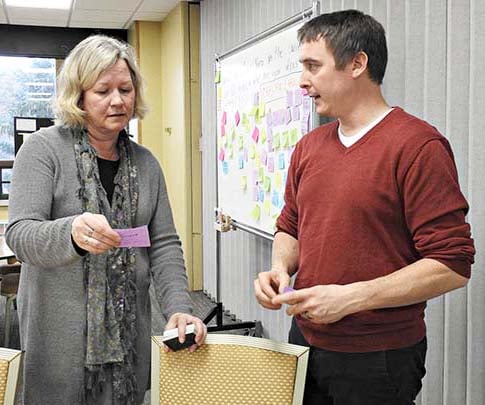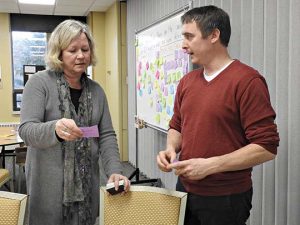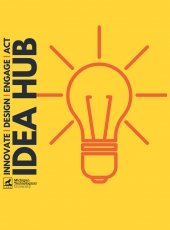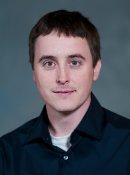
The Process Safety and Environmental Protection special issue on Advanced Oxidation Process (Elsevier), has accepted for publication a paper by associate professor Daisuke Minakata (CEE), his students Robert Zupko, Divya Kamath, and Erica Coscarelli, and his collaborator and co-PI Mark Rouleau (SS), ICC Center for Data Sciences. pictured at left with Mary Raber. Photo by Daily Mining Gazette.
The paper concerns research supported by the National Science Foundation’s Chemical, Bioengineering, Environmental and Transport Systems (CBET) Division.
Grant Title: Coupling Experimental and Theoretical Molecular-Level Investigations to Visualize the Fate of Degradation of Organic Compounds in Aqueous Phase Advanced Oxidation Systems
Grant Abstract: The lack of an overarching management plan combined with uncertainty about the adverse human health and ecological impacts of trace amounts of known and emerging organic compounds have raised public concerns about water. These issues also present major challenges to next generation water treatment utilities dealing with de facto and planned wastewater reuse. Advanced oxidation processes that produce highly reactive hydroxyl radicals are promising technologies to control trace amounts of organic compounds. Although the initial fate of hydroxyl radical induced reactions with diverse organic compounds have been studied, the mechanisms that produce intermediate radicals and stable-byproducts are not well understood. Significant barriers remain in our understanding of complex multi-channel elementary reaction pathways embedded in peroxyl radical bimolecular decay that produce identical intermediate-radicals and stable-byproducts. The model developed in the course of this research will give researchers and policy makers the ability to predict the likely chemical by-products and alternative options to provide least adverse impact on the general public who will directly consume this water or other ecological organisms who will be exposed indirectly.
The proposed study will integrate three thrusts to discover the currently unknown fate of the three major degradation pathways. First, we will perform pulse-photolysis kinetic measurement to determine the temperature-dependent overall reaction rate constants for multi-channel peroxyl radical reactions. We will also measure the resulting byproducts using a mass spectrometry. Second, we will employ quantum mechanical theoretical calculations to determine the elementary reaction pathways and associated reaction rate constants. Third, we will then combine our kinetic measurements with our theoretical calculations to develop an agent-based model that will enable us to visualize and predict the fate of organic compounds. With explicitly assigned reaction rules and molecular behavior embedded within a simulated reaction network, the resulting agent-based model will use software agents to represent radical species and organic compounds and then simulate their interactions to predict corresponding consequences (i.e., byproducts) over time and space. Finally, experimental observations will validate the outcomes from the agent-based model.
The Chemical, Bioengineering, Environmental and Transport Systems (CBET) Division supports innovative research and education in the fields of chemical engineering, biotechnology, bioengineering, and environmental engineering, and in areas that involve the transformation and/or transport of matter and energy by chemical, thermal, or mechanical means.


